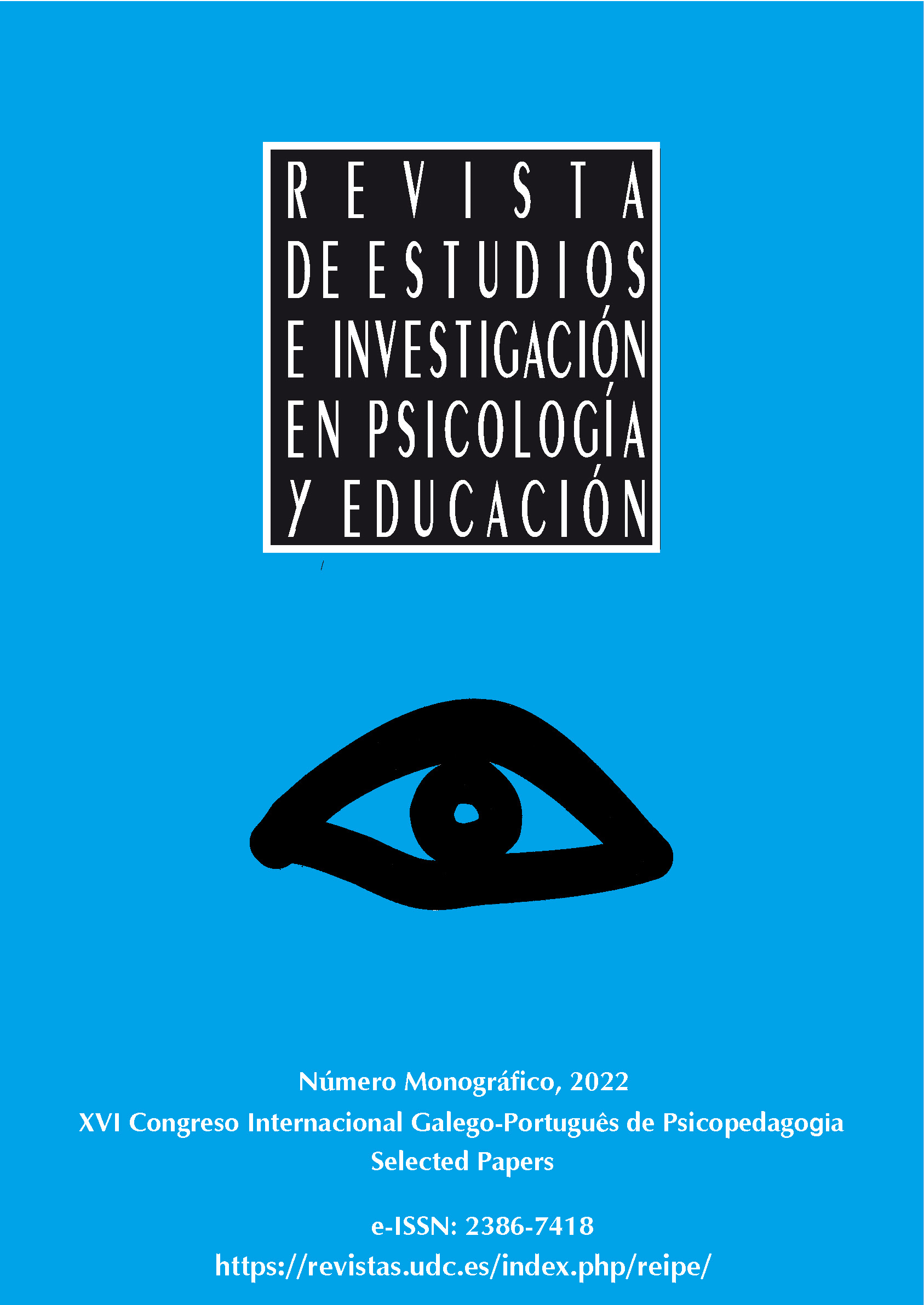Personalidad, resiliencia y bienestar subjetivo de estudiantes de educación superior
Contenido principal del artículo
DOI:
https://doi.org/10.17979/reipe.2022.9.0.8907Resumen
Este estudo tem como objetivo investigar as relações entre a personalidade, a resiliência e o bem-estar subjetivo de alunos do ensino superior, testando o valor preditivo que a resiliência possa acrescentar às dimensões da personalidade. A amostra é constituída por 197 participantes, com idades compreendidas entre os 18 e os 29 anos, de ambos os sexos. Para avaliar as variáveis em estudo foram aplicados o Big Five Inventory (BFI), a Escala de Satisfação com a Vida (SWLS), a Escala de Afetividade Positiva e Afetividade Negativa (PANAS) – versão reduzida, e a Escala Abreviada de Resiliência (BRS). Os resultados foram comparados em função do sexo e saída de casa dos pais, não se verificando, no entanto, diferenças estatisticamente significativas em nenhum dos dois. Foram encontradas correlações estatisticamente significativas entre afetividade negativa e neuroticismo. A resiliência correlacionou-se com a extroversão. Satisfação com a vida apresentou correlações significativas com amabilidade, conscienciosidade e resiliência. E ainda, a afetividade positiva apresentou correlação significativa com a resiliência, com a satisfação com a vida e com todas as dimensões da personalidade, menos com o neuroticismo. Os resultados indicam que, efetivamente, a personalidade é um forte preditor de bem-estar, e que a capacidade de resiliência apresenta relações positivas significativas com a satisfação com a vida e afetividade positiva e relação negativa com a afetividade negativa.
ção negativa com a afetividade negativa.
Descargas
Detalles del artículo
Referencias
Arnett, J. J. (2007). Emerging adulthood: What is it, and what is it good for? Child Development Perspectives, 1(2), 68–73. https://doi.org/10.1111/j.1750-8606.2007.00016.x
DeNeve, K. M., & Cooper, H. (1998). The happy personality: A meta-analysis of 137 personality traits and subjective well-being. Psychological Bulletin, 124(2), 197–229. https://doi.org/10.1037/0033-2909.124.2.197
Diener, E., & Diener, M. (1995). Cross-cultural correlates of life satisfaction and self-esteem. Journal of Personality and Social Psychology, 68(4), 653–663. https://doi.org/10.1037/0022-3514.68.4.653
Diener, E., Emmons, R. A., Larsen, R. J., & Griffin, S. (1985). The Satisfaction With Life Scale. Journal of Personality Assessment, 49(1), 71–75. https://doi.org/10.1207/s15327752jpa4901_13
Ferreira, J. A., Francisco, M., Félix, D. (2021). The Brief Resiliency Scale para a população portuguesa. (trabalho não publicado). Faculdade de Psicologia e de Ciências da Educação da Universidade de Coimbra
Galinha, I. C., Pereira, C. R., & Esteves, F. G. (2013). Confirmatory factor analysis and temporal invariance of the Positive and Negative Affect Schedule (PANAS). Psicologia: Reflexão e Crítica, 26(4), 671–679
Garcia, D., & Erlandsson, A. (2011). The relationship between personality and subjective well-being: Different association patterns when measuring the affective component in frequency and intensity. Journal of Happiness Studies: An Interdisciplinary Forum on Subjective Well-Being, 12(6), 1023–1034. https://doi.org/10.1007/s10902-010-9242-6
John, O. P., Donahue, E. M., & Kentle, R. L. (1991). The Big Five Inventory--Versions 4a and 54. University of California, Berkeley, Institute of Personality and Social Research
Kaplan, H. B. (1999). Toward an understanding of resilience: A critical review of definitions and models. In M. D. Glantz & J. L. Johnson (Eds.), Longitudinal research in the social and behavioral sciences. Resilience and development: Positive life adaptations (p. 17–83). Kluwer Academic Publishers
Lucas, R. E., & Diener, E. (2009). Personality and subjective well-being. In E. Diener (Ed.), The science of well-being: The collected works of Ed Diener (pp. 75–102). Springer Science + Business Media
Lucas, R. E., & Diener, E. (2008). Subjective well-being. In M. Lewis, J. M. Haviland-Jones, & L. F. Barrett (Eds.), Handbook of emotions (pp. 471–484). The Guilford Press
Lucas, R. E., Diener, E., & Suh, E. (1996). Discriminant validity of well-being measures. Journal of Personality and Social Psychology, 71(3), 616–628. https://doi.org/10.1037/0022-3514.71.3.616
Martins, M. H., & Jesus, S. D. (2007). Factores de resiliência e bem-estar: Compreender e actuar para resistir. Psicologia da Saúde: Teoria e Pesquisa, 85-113
Orozco-Solís, M. G., Bravo-Andrade, H. R., Ruvalcaba-Romero, N. A., & Alfaro-Beracoechea, L. N. (2021). Resiliencia en adolescentes: el papel de la conectividad con la escuela y familia. Revista de Estudios e Investigación en Psicología y Educación, 8(1), 20-36. https://doi.org/10.17979/reipe.2021.8.1.7097
Ozer, D. J., & Benet-Martínez, V. (2006). Personality and the prediction of consequential outcomes. Annual Review of Psychology, 57, 401–421. https://doi.org/10.1146/annurev.psych.57.102904.190127
Simões, A. (1992). Ulterior validação de uma escala de satisfação com a vida (SWLS) [Further validation of the Satisfaction with Life Scale]. Revista Portuguesa de Pedagogia, 26(3), 503–515
Simões, A., Ferreira, J., Lima, M., Pinheiro, M., Vieira, C., Matos, A., & Oliveira, A. (2000). O bem-estar subjectivo: Estado actual dos conhecimentos. Psicologia, Educação e Cultura, 4(2), 243-279
Simões, A., Ferreira, J., Lima, M., Pinheiro, M., Vieira, C., Matos, A., & Oliveira, A. (2003). O bem-estar subjectivo dos adultos: Um estudo transversal. Revista Portuguesa de Pedagogia, 37(1), 5-30
Smith, B. W., Dalen, J., Wiggins, K., Tooley, E., Christopher, P., & Bernard, J. (2008). The brief resilience scale: assessing the ability to bounce back. International Journal of Behavioral Medicine, 15(3), 194–200. https://doi.org/10.1080/10705500802222972
Society for the Study of Emerging Adulthood (SSEA). (2016). Overview. Retrieved from http://ssea.org/about/index.htm
Steel, P., Schmidt, J., & Shultz, J. (2008). Refining the relationship between personality and subjective well-being. Psychological Bulletin, 134(1), 138–161. https://doi.org/10.1037/0033-2909.134.1.138
Silva, O. D. L. D., Caldeira, S. N., Sousa, Á., & Mendes, M. (2020). Estratégias de coping e resiliência em estudantes do Ensino Superior. Revista E-Psi, 9(1), 118-136.
Wagnild, G. M., & Young, H. M. (1993). Development and psychometric evaluation of the Resilience Scale. Journal of Nursing Measurement, 1(2), 165-178.
Watson, D., Clark, L. A., & Tellegen, A. (1988). Development and validation of brief measures of positive and negative affect: The PANAS scales. Journal of Personality and Social Psychology, 54(6), 1063–1070. https://doi.org/10.1037/0022-3514.54.6.1063



